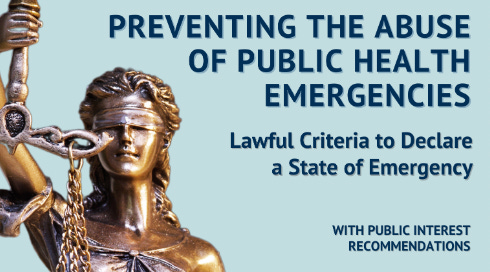Did Covid-19 Threaten the Life of a Nation?
To raise awareness of what constitutes an emergency and what States' obligations are in such, World Council for Health has published a Legal Brief on Preventing the Abuse of Public Health Emergencies
During the Covid-19 period, unlawful … pseudo-legal emergency regulations breached the fundamental human rights of billions of people globally.
Was Covid-19 a Trojan Horse for an attempted New World Order?
Many consider Covid-19 to have been a worldwide ‘Trojan Horse’ event that enabled human rights and freedoms to be trampled, dangerous medical interventions to be normalised, and an unprecedented transfer of wealth to take place from ordinary people to the super-rich. There is deep concern too that this was just a trial run, and that the immanent promulgation of the World Health Organization’s (WHO’s) ‘Pandemic Treaty’ and amended International Health Regulations will take these tyrannical measures to an entirely different level.
In response to these concerns, the World Council for Health (WCH) has published a Legal Brief on Preventing the Abuse of Public Health Emergencies. This document explains how governments used the declaration of an unjustifiable state of emergency as a legal instrument to deny people their basic human rights and freedoms, and to grant themselves extraordinary powers.
Did Covid-19 meet the pre-requisites to declare a legitimate state of emergency?
The critical question that should have been addressed at the time was whether the threat posed by Covid-19 represented a public health emergency that threatened the life of the nation. The Legal Brief presents four criteria to be used to determine if a state of emergency should be declared. These criteria state that the threat should:
be actual or imminent;
involve the whole nation;
place the continuation of the organised life of society at risk of extinction; and
be so extraordinary that ordinary measures for protecting public health and order are clearly inadequate.
The arguments presented in this thoroughly referenced document show that the Covid-19 event never actually met any of these criteria. Thus, as it did not meet the legal conditions of an emergency ‘threatening the life of a nation’, all derogation measures such as lockdowns, mask mandates, school and small business closures, travel restrictions, and harmful vaccine mandates, were illegal breaches of International Human Rights Law (IHRL).
All States have a legal obligation to enact public policy that protects, respects, and ensures fundamental human rights. Furthermore, certain norms and fundamental human rights exist that can never be violated, not even during a declared state of emergency. Instead, during Covid-19, governments around the world chose to follow the recommendations of WHO, ignore the rights of citizens, and enact oppressive public health actions. It is also of huge concern that human rights organisations failed to hold governments to account for their abuse of emergency measures.
The Legal Brief maintains that, had people across the board been properly informed about the requirements of IHRL and the prerequisites necessary to declare a legitimate state of emergency, these gross violations of fundamental human rights would not have been possible.
Recommendations
To prevent future public health emergencies resulting in similar human rights abuses, the Legal Brief therefore recommends the following actions:
To educate the public regarding the criteria to declare a legitimate state of emergency;
To establish panels to monitor adherence to IHRL and communicate violations; and
To establish activist groups to take necessary proactive legal action.
As the Legal Brief concludes:
… the widespread misuse of emergency measures during the course of the COVID-19 pandemic has confirmed the view that, de facto, there “are no ultimate institutional safeguards available for ensuring that emergency powers be used for the purpose of preserving the Constitution.” The only thing that can guarantee this is the people’s own knowledge of the law, proactive legal action, and their determination to ensure that their governments do not abuse their discretionary power by imposing self-serving, biased, or arbitrary limitations on fundamental human rights.
We trust that this Legal Brief will be useful to lawyers and lay people alike in furthering legal and lawful recourse in the pursuit of Truth and Justice. You can download the full brief here.
The World Council for Health team is on a mission to help Humanity.
What do we do? Here are some photos from our photo library…
Community talks on health sovereignty in Wales, UK
Campaigning to Exit the WHO in Ireland
Informing parliamentary debates in UK parliament w.r.t the WHO and COVID-19 ‘vaccine’ harms
Press Conference in Ireland on impact of WHO power grab on human rights and sovereignty
Taking the message to the people in Southhampton, UK
Establishing WCH Philippines for international collaboration and solidarity
Please help us create a better world for your children by making it your mission to fund us.
All proceeds from subscriptions to this Substack go to the work of the World Council for Health. You can also make a one-off donation or become a regular monthly donor in 2024 to support our expanding WCH team and humanitarian work.










“… the widespread misuse of emergency measures during the course of the COVID-19 pandemic….”
Question: Was there even a “pandemic”?
IF the answer is “no”, then WHY continue the use of the word “pandemic”???
Why not call it an “event” instead? Or something similar.
The continued use of the word “pandemic” is re-inforcing the “official” narrative… IMO…
BTW... I just subscribed to leave this comment, because it feels important enough to me. Words are important.. I MAY stay on with the subscription... or not...